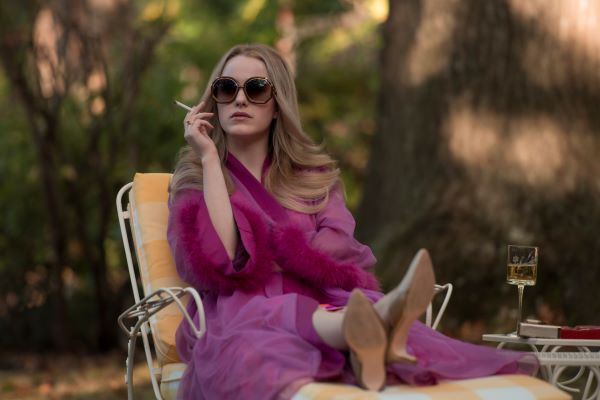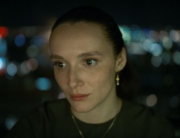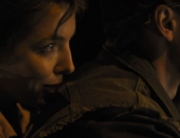
Thrillers tend to benefit from an embrace of heightened circumstances and, sometimes, mild departures from realism. Blood Simple, for instance, thrives on the complete absence of the police, Blue Velvet from its surreal world and hyperbolically grotesque villain. I’m Your Woman, which is set in the 1970s, also asks us to embrace an unlikely situation and plunges us into uneasy, slightly unreal territory.
In the first scene, Jean (Rachel Brosnahan) tells us in a voice-over that she and her husband, Eddie (Bill Heck), have not been able to conceive. Soon after, Eddie walks through the door carrying a baby boy. He refuses to say where the child came from, his manner is calm and a little patronizing, and he tells her that this is the baby they’ve always wanted and to stop worrying. She accepts. Soon after, he disappears, and Cal (Arinzé Kene), an associate of Eddie’s, ushers Jean to safety, and he too refuses to explain anything. We, like Jean, are in the dark.
Though there is a flurry of activity in its third act, for much of the movie, the action is curiously domestic. Jean is forced to live in a few strange homes that have been mysteriously set up for her by Eddie’s people, and for long stretches of time, we watch her wait. She admits to Cal that she’s never been on her own before, she’s a bad cook, and she fights to keep the baby (who she names Harry) happy and well. Most of all, she struggles with how little she knows as to what’s happening, and she’s afraid.
We have the sense that, for her, this is an almost existential condition. She has always known that Eddie is a thief, but he has kept her safe and provided for her without telling her much at all about his life, or ensuring that she is able to take care of herself. The predicament she’s now in—caring for a baby as she fears for her life—is the culmination of a life lived in ignorance.
Though there is sometimes an uneasy balance between sincere drama and a Lynchian or Pinteresque eye for the peculiar, and a few dialogue sequences early on struck me as unimaginative, this is nevertheless a film I’d recommend. There is scarcely a shot that is not strikingly framed, the color palate is rich and distinctive, and we feel that we have genuinely entered a world that is similar but not identical to ours. There is also something surreally seedy about many of the locations. The atmosphere is tense, violence lurks beneath the surface, and, given the relative stillness of so much of the film, the more explosive sequences, such as an eruption of violence in a nightclub, have a special impact.
Most of all, it’s compelling to see the world through Jean’s eyes and to inhabit her humiliating state of unknowing. Like Rosemary’s Baby or In the Cut, this is a film where the world conspires against its protagonist and every odd camera angle or unidentifiable sound offers proof of this conspiracy. Unlike those films, this is not one where she’s ultimately at the mercy of her dire circumstances. Though this world is dangerous and full of mysteries that cannot be solved, this movie says that we can nonetheless learn to navigate it.






Leave A Comment